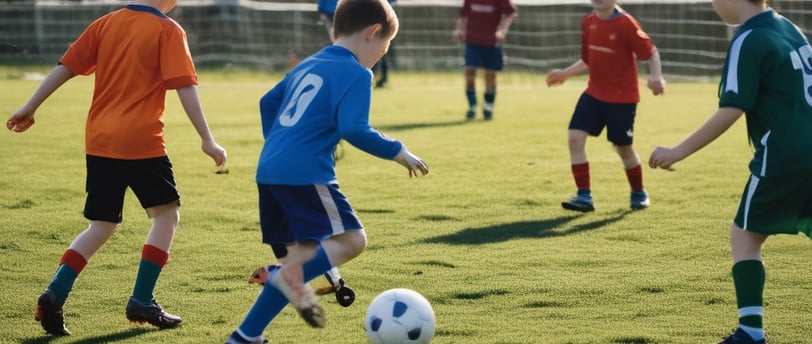Beyond The Playbook - The Future of Junior Grassroots Football: What’s Changing and Why It Matters
Grassroots football has always been the heartbeat of the game, providing young players with the foundation to develop skills, build character, and foster a lifelong love for football. As we step into a new era, significant changes are on the horizon for junior grassroots football, aimed at improving player development, safeguarding, and inclusivity. But what exactly is changing, and how will it impact players, coaches, and parents?
SPORTS
NWSolutions
5/8/20244 min read


A New Framework for Player Development
One of the most anticipated changes is a revised structure for junior football, designed to ensure a smoother transition from one age group to another. The new framework will introduce:
Modified game formats to enhance player engagement and skill progression. These include smaller-sided games such as 4v4 for the youngest age groups, progressing to 5v5, 7v7, and eventually 9v9 before reaching full 11-a-side football. This approach allows players to have more touches on the ball, develop decision-making skills, and increase overall involvement in the game.
Flexible competition structures allowing young players to develop at their own pace. This means introducing tiered leagues and development-focused festivals rather than rigid league tables. Players will have the chance to play in environments that match their skill level, ensuring balanced competition and reducing the pressure of results-driven football.
Improved coaching strategies with a focus on individual growth rather than just winning matches. Coaching will now emphasize player development through guided discovery, game-based learning, and an increased focus on technical skills. Training sessions will incorporate more small-sided drills, positional rotations, and personalized feedback to ensure every player is learning and progressing at their own pace.
This shift prioritizes long-term development, ensuring that young players remain motivated and continue to enjoy the sport while learning key fundamentals at the right stages.
Increased Safeguarding Measures
Safeguarding has been a crucial topic in grassroots football, and upcoming changes aim to strengthen protection for all involved. These updates will include:
Stricter background checks and mandatory training for all coaches and volunteers. The new requirements will include more comprehensive Disclosure and Barring Service (DBS) checks, annual refresher safeguarding training, and compulsory child protection courses to ensure all adults working with young players are fully vetted and educated on best practices.
Enhanced reporting systems for safeguarding concerns. A new, centralized digital reporting system will be introduced, allowing for quicker and more transparent case management of safeguarding issues. This will include a dedicated hotline and anonymous reporting options, ensuring that concerns are addressed promptly and efficiently.
Greater emphasis on mental health support for young players navigating the pressures of competition. Clubs will be encouraged to integrate mental health awareness programs, provide access to qualified sports psychologists, and offer regular well-being check-ins. Coaches will also receive training in recognizing signs of anxiety, burnout, and stress to better support their players both on and off the pitch.
These measures ensure a safer and more supportive environment where children can develop both as players and individuals.
Emphasizing Inclusivity and Accessibility
Football should be for everyone, and the new changes will focus on making the game more inclusive. Initiatives being introduced include:
More opportunities for girls to play and compete at the same level as boys. This will include the expansion of girls-only leagues, more mixed-gender training sessions, and increased funding for female grassroots teams. National governing bodies are also committing to providing more female role models in coaching and officiating, ensuring girls see a clear pathway to progress in the sport.
Stronger pathways for players with disabilities, ensuring they have the same opportunities to enjoy and progress in the sport. More disability-friendly coaching qualifications will be introduced, alongside tailored training sessions and adapted competitions to ensure inclusivity. Clubs will be encouraged to establish inclusive teams and provide necessary resources such as accessible facilities and specialized coaching staff.
Affordability initiatives to reduce financial barriers for families wanting their children to participate. New funding programs will be introduced, including subsidies for registration fees, free equipment schemes, and partnerships with local businesses to offer sponsorship opportunities. Additionally, clubs will be encouraged to introduce flexible payment plans and grant programs to support families facing financial hardship.
These developments are crucial in ensuring that grassroots football continues to be a sport that welcomes all, regardless of background, gender, or ability.
What This Means for Parents and Coaches
For parents, these changes mean a more structured, safe, and enjoyable environment for their children to play football. They can expect:
A greater emphasis on skill development over competition pressure. The focus will be on individual player improvement, creativity, and confidence-building rather than purely on winning matches. More clubs will adopt a philosophy that prioritizes technical development and enjoyment over results.
More transparency in how clubs and leagues operate. New regulations will require clubs to clearly communicate their coaching methods, financial structures, and safeguarding policies. This transparency will help parents make informed decisions about where their children play and ensure accountability within grassroots organizations.
Assurance that safeguarding is at the heart of junior football. With enhanced checks, better reporting systems, and increased training for staff, parents can feel more confident that their children are playing in a safe and supportive environment. Clubs will be required to have dedicated safeguarding officers and publish their policies to ensure compliance with the latest standards.
For coaches, these adjustments will bring new training resources and development opportunities, allowing them to be better equipped in mentoring and nurturing young talent.
Looking Ahead: How You Can Get Involved
With these exciting changes on the horizon, now is the perfect time to get involved in grassroots football. Whether as a coach, parent, or volunteer, your contribution will play a vital role in shaping the future of the game.
Stay informed, support local clubs, and encourage young players to embrace these new opportunities. The future of junior grassroots football is evolving, and together, we can ensure it remains a thriving, inclusive, and enjoyable experience for all.
